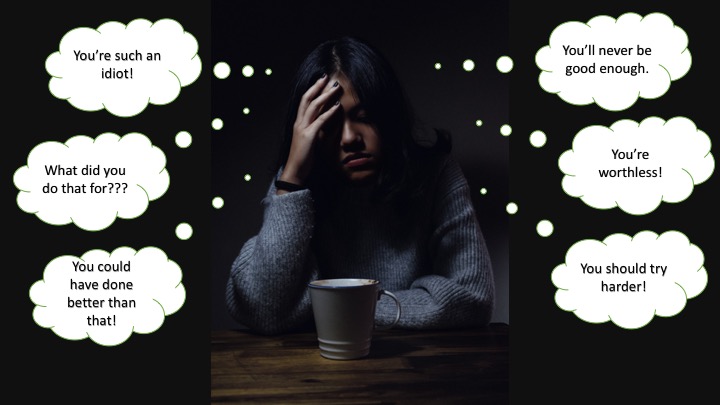Stop for a moment and listen to the voice inside your head. How does this voice sound? Is it kind to you or harsh? We all ‘self talk’ and it can be really helpful when this inner voice motivates us, reassures us or stops us from a bad habit. But when this voice attacks us, it can be demotivating and even destructive.
The self attacking voice in our heads is known as the “inner critic” and it can be loud and harsh.
“What did I do that for? I’m such an idiot!”
“I’m so fat!”
“I’ll never make anything of my life!”
“I’m so hopeless!”
“How could I be so stupid?”
“I’ll never get this right!”
This inner critical voice has been with us since very early in our lives. It’s our most consistent companion and many of us seem to think that it is ok to talk to ourselves in this way. And yet researchers, such as British psychology professor Paul Gilbert, have shown that people with strong inner critics are more prone to stress, anxiety and depression.
Maybe you’ve tried to change this voice with positive affirmation statements or to silence it through meditation, but it’s very hard to fool yourself or to shut this voice down and despite all your efforts, the inner critic is loud and clear and bossy as ever: “Yeah right! As if!” So you check to see if it’s 5pm yet: “Surely it’s time for my evening glass of wine!” or you reach for some chocolate or cake or some other comfort food and get lost in Facebook for a while. It’s much easier to numb.
What if you really started listening to this voice and what it has to say? What if you put on a different set of ears and listened through the negativity and criticism to what is really being expressed? When your close friend says “I’m such an idiot!”, they’re really telling you that they are feeling ashamed or angry about something they’ve done. You don’t say “yes you are!”. You give them love and reassurance or hear them in their pain. Our inner critic is just like your self critical friend – it’s using habitual language learnt in childhood. It just doesn’t know how else to express itself to you. And, like we do with our loved ones, we can turn towards this inner critic and really listen with compassion, love and curiosity.
The more we identify with the inner critic, the more we stay in a state of helplessness and disempowerment. Through slowing down, allowing, tuning into our bodies and really starting to listen, we can get more in touch with what really matters to us in our lives and then we start to make different choices and have more clarity when things aren’t going the way we hoped. The path to empowerment and really creating the life we want is through self compassion.
When we can be better friends to ourselves, we can be better parents, lovers, children, friends, neighbours, colleagues and citizens. A compassionate world is created by compassionate people and it starts with our relationship to ourselves.

